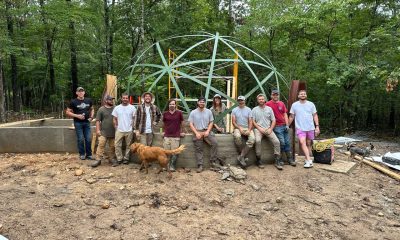Lifestyle
The Reasons For Seasons

There are many reasons why we have seasons in this realm, and most of those reasons are never thought about by the vast majority of the population. Depending on your geographical location, seasons are typically associated with a complaint. It’s too hot during summer, too cold during winter, too rainy in autumn and spring. Folks tend to always have some sort of grief with the weather, and society has morphed holidays into a way of getting through these seasons. We look forward to the “holiday season” of Halloween, Thanksgiving, Christmas, etc. We jam pack as many holidays into the course of a few months as we can to give ourselves something to look forward to in those wet, cold, dreary times. And in doing so I would argue that we’ve all but lost the true reasoning behind the changing seasons.
To start this, we need to view things (as best as we can) from God’s perspective, and his intentions for us. If His intentions were for us to always be fed, have no hardships in life, have superficial relationships with family/friends, and simply have fun all the days of our lives, then we would live in perpetual summer. The sunlight would beat down all day every day, producing monstrous crops year round. We wouldn’t have to worry about the cold. We wouldn’t have to plan ahead. We wouldn’t need to form communities with the sole intention of surviving.
But God’s intention for us in this life is not that. His intention is for us to grow. Growth requires dark times, both literally and metaphorically, as much as it requires what we associate with good times. A plant will die if it just has sunlight and gets no water. It will die if it doesn’t get the proper nutrition. It will die if it gets eaten by bugs. So to will we wither away if we don’t have a proper balance of perspectives, reflection, appreciation, nutrition, emotional experiences, etc. A plant will grow better with companion planting. Corn grows well with beans and squash. They provide what the other is lacking. We too require community to really thrive, and the seasons are the ultimate factor in the creation of these communities.
Spring: Springtime is a wondrous time to experience. You can feel the life energy in the air as the trees start sprouting leaves again, the birds start singing, the flowers start to bloom, and you see all of the newly born critters running about. The persistent cadence of short rains and bright sunlight tells everything that it’s time to wake from winter’s slumber and start to grow. This too happens within us. Every year at this time we all experience that kick of energy. We all start to plan our gardens, plan what we’d like to accomplish in our lives for the year, what projects we’d like to complete, and where we’d like to be when winter rolls around again. We look at our bodies, full of baked goods and potatoes and think “yeah, it’s time to start working out again”. We have a primal urge to better ourselves. This is what spring is for.
Summer: Summer is typically viewed as the time to have fun. There’s truth to this, but it’s also a continuation of spring in terms of growth. In spring we plan, and in summer we build and maintain. Our crops need constant tending. Our bodies need constant hydration and nutrition. And although it seems easier to get things done in summer, anyone with any level of perception knows that although energy levels are high, you can quickly burn out with the constant heat and endless light. Again, we require balance. Towards the end of summer we all look forward to autumn, because we know it will bring rest. But until that day comes, summer is when we work hard. And we should be working hard to ensure we have enough food and supplies for the cold months. As spring was to planning, so is summer.
Autumn: After 6+ months of heat, sunlight, growth, work, fun, excitement, and joy, autumn brings with it a much needed respite. We are not made to crush nonstop 100% of the time, and autumn forces us to slow down and rest. The waning hours of sunlight change our circadian clock and our bodies start producing melatonin earlier in the evening, making us tired at 6pm rather than 10pm. We no longer have an abundance of those high sugar fruits that are ripe off the tree (or we shouldn’t in a natural world), and we move towards meats and root vegetables which are stored more easily. This changes our digestive habits. It changes the flora in our digestive tract, which changes our mood. As we consume more calorie and nutritionally dense foods, our digestion slows, and we begin to slow. The almost manic energy that spring and summer bring fades into a calmness, a sleepiness, and a desire to curl up by a fire and read yourself to sleep under a blanket. Bears hibernate, as do we in a way. Autumn is designed to slow us down so we don’t burn ourselves out, to reflect on what we’d like to do differently next year, to appreciate all of the blessings we have, and most importantly to begin resting our bodies.
Winter: The most trying season of them all, winter brings with it bone chilling cold, a minimal diet (or so it would be in a natural world), little light, no growth, and many hardships. Winter is still, and it is still for a reason. Everything on this earth needs a period of deep rest. Every animal rests during winter. Most plants go entirely dormant. Some animals sleep for months. Some bugs literally get frozen into a state of suspended animation until springtime when they thaw and their hearts start beating again. This is all by God’s great design. We all know physical rest is needed. If you don’t sleep for a couple of days you begin to hallucinate and your body begins shutting down. Nobody will argue the importance of a good night’s sleep. But we also require emotional rest, mental rest, and spiritual rest. We need time to quietly reflect on not just the past year, but also on life itself. We need to reflect on our relationships, on our communities, on our jobs, on our life path, and on the trajectory we would like to see in our individual lives. God has given us a time to do this, and it is winter. It’s almost forceful, in that most things we enjoy are stripped away for months, leaving us with only our primal desires. We want warmth, dryness, and food. And in that state of primal survival, we reflect. As we grow our physical strength in spring and summer, we should be growing our emotional and spiritual strength during winter. When all is lost, and we are cold and wet and hungry, we should be looking to God. We should be looking to our communities. We should be looking to our families, who are often overlooked during the excitement of all the chores and projects the other seasons bring. Winter is often seen as a bad thing solely because of the weather, but if you tap into what is actually happening during these months it is beauty beyond compare. We are resting. We are sleeping more. We are reflecting. We are seeking God. Our bodies, minds, hearts, and souls are healing. Most people literally purge toxins in the form of illness. Again, this is perceived as a bad thing, but it is our body making us stronger and cleaner. Winter brings endless blessings.
Many people view life by the year. They judge themselves on what happened during the course of a giant block of time. But there are seasons within that year. And if we overlook them, and do not pay them their property dues and work with them rather than against them, we can be sure to come up short each year in regard to our self-imposed expectations. If you don’t rest during winter, you won’t have the energy to crush during summer. If you don’t crush during summer and prepare, then you won’t make it through winter.
These natural rhythms have been thrown off with the adoption of cross-country and worldwide shipping, artificial lighting, climate controlled buildings and cars, etc. In a natural world we should not be able to get into our heated vehicle, drive to a grocery store, buy a papaya, go home, and eat it in a fully lit room at midnight in the dead of winter. It is entirely unnatural. And as a result, we feel like we’re living unnatural lives. And it’s because we are. We are not honoring the seasons, the reasons they exist, and we are working against them. This is, in my opinion, directly fighting God’s plans, intentions, and reasoning.
To shift from an unnatural/artificial existence into one more in line with what we’re intended to experience, one can simply make small changes. Those changes will have a massive affect on your health in all areas of life. Instead of having every light on in the house all night after the sun sets in winter, have a small lamp on. Let your body start the production of melatonin. When you get tired, go to bed. Don’t stay up until 2am working. Eat hearty meals that are packed with nutrition and meat during winter, rather than exotic fruits. Let your body replenish itself with what it needs, rather than what tastes good. During summer, don’t sleep in until noon. We’re meant to wake when the sun rises. Don’t pull your curtains shut before bed to block out that morning light. Let it wake you. During autumn, allow yourself to slow down a bit. Things can wait. If you’re pushing through this season as if it’s still summer, you will most definitely crash. One way or another you will get that rest. It’s just a matter of if it’s in a calm manner, or in a state of deathly illness. The choice is always yours.
Honor the reason for the seasons, which is God’s great design, and your life will undoubtedly improve. You don’t need high energy at all times. On the contrary, we are meant to store energy for times of need. We then use that energy, and it needs to be replenished. Replenish yourselves during the times we’re meant to. Live a natural life, and you will not only strengthen yourself but will also bring so much more to your communities. Embrace the hot, the cold, the joy, and the melancholic stillness as blessings, because that’s exactly what they are.

Social media shows doomsayers, pessimists, and even truther-prepper types blasting out warnings of impending doom and gloom. You may feel the urge to fight if you can bear this without your emotions causing you to flee or freeze.
But what does fighting for your future mean? Unfortunately, much internet commentary directs your focus to what others are doing and how they affect you, calling for action to demand change. While this may have its place, it neglects the freedom we already possess and can inadvertently bypass our authority and control.
Here are a few simple things to think about that can help you fight against the future you don’t want, by building the future you do want.
Financial Future
Securing your financial stability is the cornerstone of building a successful future. This starts with becoming debt-free. Debt is a shackle that limits your freedom and ties you to a system you might not align with. Aim to clear your debts quickly and avoid taking on new ones.
Next, focus on land ownership. Owning land provides a place to call home and offers opportunities for self-sufficiency, such as gardening, raising livestock, or even setting up a small business. This autonomy can buffer against economic uncertainties and offer a sense of security.
Continually work towards a sustainable income. Whether through traditional employment, investments, freelancing, or entrepreneurial ventures, ensure your income sources are diversified and resilient to economic shifts. Build skills that are in demand and can be adapted to various roles. Financial independence is crucial in crafting a future you control rather than one external force dictates.
Education
Education is the foundation of personal and professional growth. Embrace self-study and continuous learning. The more skills and knowledge you acquire, the more adaptable you become in a rapidly changing world. Invest in personal improvement by setting aside time for reading, courses, and practical skill-building.
Homeschooling is another powerful tool. It allows you to tailor education to your family’s needs and values, ensuring your children learn what truly matters. Foster a love of learning in your household, emphasizing critical thinking, creativity, and practical skills over rote memorization.
Family Protection
Protecting your family goes beyond physical safety; it involves being a guiding force and a source of stability. We must also protect our families from negative and misguided influences. Be a leader to your children by setting a positive example. Teach them resilience, self-reliance, and the importance of moral values. Strengthen bonds with your siblings through support and cooperation, creating a solid familial network.
Honoring your seniors is equally essential. They possess invaluable wisdom and experience. Encourage intergenerational communication and respect, ensuring your family’s heritage and lessons are passed down.
Mindset
Your mindset is the driving force behind every action. Take ownership of your life and decisions, understanding that responsibility and accountability are keys to freedom. Respect your time and finances, recognizing them as finite resources that require careful management.
Develop a mindset of resilience and adaptability. Life is unpredictable, and being mentally prepared for challenges ensures you can face them head-on. Cultivate a positive outlook, focusing on solutions rather than problems. This proactive attitude will guide you in building the life you want.
Community Building
No one succeeds alone. Connect with people who share your values and vision. Building a community of like-minded individuals offers support, shared resources, and collective wisdom. Engage in activities and friendships that bring joy and complement your life.
We would like to take it a step further by saying, we don’t build the future we want as a reaction to the future we don’t want. We build, because we love, its fun and fulfilling. Our fight is to thrive, not to survive. Survival is a consequence of thriving. So aim high! Take control of your life, embrace self-responsibility, and connect with others on the same path.
Those looking to connect with a broader network should consider joining our Community app. It’s a platform dedicated to bringing together individuals who strive for independence. Whether you’re looking for advice, collaboration, or simply companionship on your journey, our thriving community is a valuable resource.
The power to shape your future is in your hands.
Lifestyle
Making Pine Needle Soda: A Fantastic Foraged Beverage
Pine needle soda, a truly one-of-a-kind beverage, has been savored worldwide for its zesty taste and health benefits.

Pine needle soda, a truly one-of-a-kind beverage, has been savored worldwide for its zesty taste and health benefits. It’s not just a refreshing drink, but also a creative use of natural ingredients. Here’s a simple guide to crafting this unique soda at home.
Pine needles are rich in antioxidants and vitamin C, which help boost the immune system. Different species of needles can offer different flavors, but it’s important to make sure the trees you harvest from are not toxic. Avoid using needles from yew, Norfolk Island pine, or Ponderosa pine. You should do additional research to insure you are staying safe.
The recipe I followed is easy and only requires a jar, strainer, and measuring cups. Start by identifying the pine tree you would like to harvest from; I used fir, tamarack, and white pine. Again, make sure you don’t use anything unsafe. You can choose to use new sprouted tips or even mature needles, which means you can also have fresh pine soda in the winter months!
You can scale up the recipe, but for reference, use the following:
- 2 Cups Pine needles
- 2 Cups Water
- 2-4 Tablespoons sugar (depending on sweetness you desire)
For the above measurements, I recommend using a quart jar. Begin by rinsing the needles, not too thoroughly, because the carbonation comes from natural yeast living on the pine needles. Add the sugar and water and seal the jar. Leave to ferment so it can become bubbly soda! Make sure to “burp” the jar every couple of days to release some of the gas so it does not build up and explode the jar! In 5-7 days, you will have soda, God willing.
Serve over ice and with some citrus if you’d like. Enjoy!
Lifestyle
Reconnect and Rejoice: Beartaria Times Weekly Challenge
Maintaining solid relationships with family and friends offers numerous benefits that enrich our lives in meaningful ways…

In our fast-paced world, losing touch with friends and family members who once played significant roles in our lives is easy. This week, the Beartaria Times invites you to participate in our heartwarming challenge: Reconnect with someone you haven’t spoken to in a while. Give them a call, ask how they’ve been, and rekindle that bond.
Maintaining solid relationships with family and friends offers numerous benefits that enrich our lives in meaningful ways:
1. Emotional Support: Close relationships provide a robust support system during tough times, offering comfort, advice, and a sense of belonging.
2. Improved Mental Health: Regular interactions with loved ones reduces feelings of loneliness and depression, contributing to mental well-being.
3. Increased Longevity: Studies have shown that strong social connections tend to help people live longer and enjoy better health.
4. Enhanced Happiness: Sharing moments, memories, and experiences with others brings joy and fulfillment, fostering a more positive outlook on life.
5. Personal Growth: Friends and family often challenge us to grow, learn, and become better versions of ourselves.
6. Creating Memories: Every interaction creates new memories, adding richness to our personal histories and offering stories to cherish for years to come.
We encourage you to take this challenge to heart and reach out to someone you miss. Whether it’s a friend from high school, a distant relative, or a former colleague, a simple phone call can reignite connections and brighten your day and theirs.
Once you’ve reconnected, share your stories and experiences on the Beartaria Times community app. Post about who you called, the memories you shared, and how the conversation went. Did you learn something new? Did you laugh about old times? These stories can inspire others to take similar steps in their lives.
Join us in this week’s challenge and celebrate the beauty of human connection. Let’s make an effort to nurture our relationships and remind those we care about that they are valued and remembered.
Happy connecting, Beartarians! We look forward to hearing your heartwarming stories.
Sincerly,
– The Beartaria Times Team
-

 Just Crushing2 weeks ago
Just Crushing2 weeks agoChristopher Gardner Completes First Dome Framing Project in Missouri: Exclusive Interview
-

 Just Crushing2 months ago
Just Crushing2 months agoBeartaria Ozark Campground Launches Community Forum!
-

 Just Crushing2 months ago
Just Crushing2 months agoMap it! – Discover Beartarians Living, Working, and Crushing Near You!
-

 Just Crushing2 months ago
Just Crushing2 months agoWhy Do We Feel So Free?
-

 Lifestyle2 months ago
Lifestyle2 months agoReconnect and Rejoice: Beartaria Times Weekly Challenge
-

 Reports2 months ago
Reports2 months agoReport: EF-1 Tornado Touches Down In The Ozarks
-

 Business2 months ago
Business2 months ago3000 Members In Our Business Group!: This Week On Our Community App!
-

 Wellness2 months ago
Wellness2 months agoBeartaria Times Member Shares History and Benefits of Haymaker’s Punch












































